Jade Varden's Blog, page 18
February 10, 2015
Writing 101: Going it Alone
I didn't tell a single member of my family, nor any of my friends, that I was writing a book. I didn't say a word about it to anyone, in fact, until it was published. Now I self-publish, and I still find it difficult to talk about my current projects. I'm used to going it alone, but I've learned that it's the absolute worst way to go about writing.
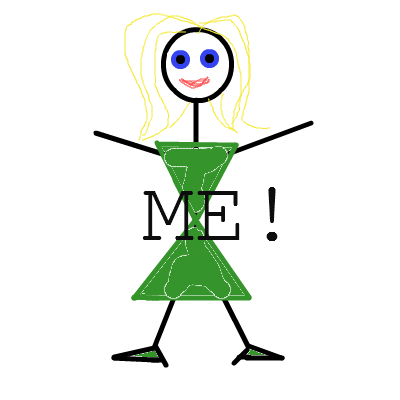
Unsupported
Writing anything is difficult. Writing a book is an exercise in self-torture. And writing a good book takes more than what you currently have inside of you. If you're going to write something great, you're going to need other people in your life to help you get through it. At the very lest, you're going to need someone who can remind you to eat something every once in a while.
I've gone on record saying that you shouldn't really talk about your book projects while you're writing the first draft. You don't want to be influenced by other people. However, once that first draft is finished it can be invaluable to check your ideas against another person -- before you open up the field to every book reviewer out there. Someone close to you is going to be a lot nicer about pointing out plot holes than I would be, for example. I'm pretty picky, and I'm really nice compared to most people who review books.
You can write a book unsupported, and publish it, too. I know this for a fact. But I also know that you're going to write a better book if you have someone else that you can talk with about it, if you have someone who can read it, and it there's someone around to remind you that you should eat something.
Don't go through your writing career unsupported. Reach out to people in your life. Reach out to forum groups. Reach out with your ideas and your thoughts, and write better.

Unsupported
Writing anything is difficult. Writing a book is an exercise in self-torture. And writing a good book takes more than what you currently have inside of you. If you're going to write something great, you're going to need other people in your life to help you get through it. At the very lest, you're going to need someone who can remind you to eat something every once in a while.
I've gone on record saying that you shouldn't really talk about your book projects while you're writing the first draft. You don't want to be influenced by other people. However, once that first draft is finished it can be invaluable to check your ideas against another person -- before you open up the field to every book reviewer out there. Someone close to you is going to be a lot nicer about pointing out plot holes than I would be, for example. I'm pretty picky, and I'm really nice compared to most people who review books.
You can write a book unsupported, and publish it, too. I know this for a fact. But I also know that you're going to write a better book if you have someone else that you can talk with about it, if you have someone who can read it, and it there's someone around to remind you that you should eat something.
Don't go through your writing career unsupported. Reach out to people in your life. Reach out to forum groups. Reach out with your ideas and your thoughts, and write better.
Published on February 10, 2015 05:30
February 9, 2015
Writing 101: Writing About Writing
Here's how you know you're watching a movie that was adapted from a Stephen King book: a) something weird is going on; b) the people in the story don't know that weirdness is going on; and c) --and this is most important-- one of the characters, probably the main one, is a writer. Stephen King writes about writers all the time, because that's what he knows. But here's what I learned in my time of writing about writers: mostly, it's only writers who are interested. Writing about writing is all well and good, but it's even better if you don't do that at all. I'll tell you why.
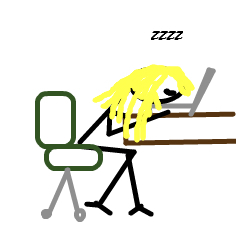
On Writing...
People are always interested when they find out that I'm a writer...at first. Once they understand that writing is me sitting on my couch and staring at my screen, they realize that writing is actually pretty boring. It is tedious, hard work. And it isn't interesting. This is why you shouldn't write about writing.
When you're a writer and that's what you know, it's natural to make your characters writers as well. But maybe you could change that, slightly, to make it more interesting. Maybe the character could be in advertising instead. Maybe he writes travel brochures. Maybe she writes book reviews, or restaurant reviews. This allows you to take your character out from behind the computer screen.
Books are supposed to mimic life, after a fashion. They should be relatable and believable. But the day-to-day details of life are boring. You can still write a believable book, and create a character that you can feel strongly about, without all the boring parts. So the next time you want to put your character in front of a computer screen, think about a different way you can send them to work instead. Writing about writing will make a character come to life for you, the writer.
Now, how are you going to make that person come alive for the reader?

On Writing...
People are always interested when they find out that I'm a writer...at first. Once they understand that writing is me sitting on my couch and staring at my screen, they realize that writing is actually pretty boring. It is tedious, hard work. And it isn't interesting. This is why you shouldn't write about writing.
When you're a writer and that's what you know, it's natural to make your characters writers as well. But maybe you could change that, slightly, to make it more interesting. Maybe the character could be in advertising instead. Maybe he writes travel brochures. Maybe she writes book reviews, or restaurant reviews. This allows you to take your character out from behind the computer screen.
Books are supposed to mimic life, after a fashion. They should be relatable and believable. But the day-to-day details of life are boring. You can still write a believable book, and create a character that you can feel strongly about, without all the boring parts. So the next time you want to put your character in front of a computer screen, think about a different way you can send them to work instead. Writing about writing will make a character come to life for you, the writer.
Now, how are you going to make that person come alive for the reader?
Published on February 09, 2015 05:30
February 6, 2015
Singing of Jade's 'Song'
"It's a tale of mermen, selkies, and adolescent youth trying to determine their place in this newly discovered strange world."

"Varden puts together this beautifully colorful and vividly imaginative world that immediately draws you in. I was entranced from the first chapter and enjoyed every twist and turn."
"Song of the Sea" has been reviewed by Ann Livi Andrews at her blog. Go check it out to learn which underwater species I would rather be, what you can expect in the next installment of the Saltwater Secrets trilogy, and who my favorite author is!
After you read the review, get your copy of Song of the Sea.

"Varden puts together this beautifully colorful and vividly imaginative world that immediately draws you in. I was entranced from the first chapter and enjoyed every twist and turn."
"Song of the Sea" has been reviewed by Ann Livi Andrews at her blog. Go check it out to learn which underwater species I would rather be, what you can expect in the next installment of the Saltwater Secrets trilogy, and who my favorite author is!
After you read the review, get your copy of Song of the Sea.
Published on February 06, 2015 05:30
February 5, 2015
Writing 101 Redux: Naming Characters
Today's Throwback Thursday covers a fundamental storytelling tool that all writers need to know: how to name a character.
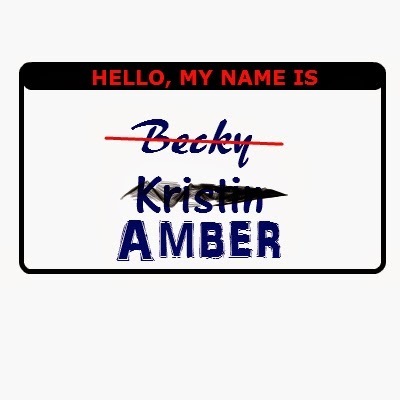
Get all the tricks for naming characters, and find out where to go to make it easier, in this TBT Writing 101.

Get all the tricks for naming characters, and find out where to go to make it easier, in this TBT Writing 101.
Published on February 05, 2015 05:30
February 4, 2015
Writing 101: By the Way, No One Gets It
As a writer, part of your job is to describe new settings, scenarios and ways of life to readers. I personally will never know what it's like to be an ER nurse who is helping the police investigate a series of hospital murders, but I can go find that book and read all about it. You can put your readers anywhere and make them feel anything...with one exception. When you try to tell ordinary civilians what you're personally going through as a writer, they won't ever really get it.

Ever.
Screaming at the Wind
Have you ever stood outside and screamed into the wind? It rips your voice away and swallows your syllables, until there's nothing left but you, standing there with a red face. This exercise is actually more effective than trying to explain what it's like to be a writer to all your friends and family.
You can put your readers on top of a mountain or down in a subterranean world inhabited by mole people, but you can't ever really tell a non-writer what it is to be a writer. Your friends and family look at you and see a sister. A dad. A wife. A son. They don't see that sometimes, you're none of these things. They don't see that you're really a prisoner of paragraphs and punctuation. They look at you and they listen to you talk about how hard it is to write, and they will never understand one basic truth.
They look at you, and they think that you made a choice to be a writer. What they don't realize, and never will, is that you don't have a choice and never did. Being a writer is never a choice. Words fly across your brain like text on a page. Ideas and situations come to you from nowhere. Stories find you at night and whisper in your ear. And you know, and I know, that you never had a choice in the matter.
But no non-writer is ever really going to get that. They will never know that you're really not a master of words. You're a prisoner of them. You're not in control of those books. When you realize something about your villain and drop whatever you're doing to go make a note or re-write that paragraph, the story is controlling you. And it's always going to.
They're not going to "get it," no matter how much you try to make them. When you get lonely, when you get sad, when you feel like you've been screaming at the wind for days, remember this: you are not the only prisoner out there. Other writers do understand. Use social media to find them and connect with them, and compare the size of your shackles. When no one else gets it, another writer will...and I do, too.

Ever.
Screaming at the Wind
Have you ever stood outside and screamed into the wind? It rips your voice away and swallows your syllables, until there's nothing left but you, standing there with a red face. This exercise is actually more effective than trying to explain what it's like to be a writer to all your friends and family.
You can put your readers on top of a mountain or down in a subterranean world inhabited by mole people, but you can't ever really tell a non-writer what it is to be a writer. Your friends and family look at you and see a sister. A dad. A wife. A son. They don't see that sometimes, you're none of these things. They don't see that you're really a prisoner of paragraphs and punctuation. They look at you and they listen to you talk about how hard it is to write, and they will never understand one basic truth.
They look at you, and they think that you made a choice to be a writer. What they don't realize, and never will, is that you don't have a choice and never did. Being a writer is never a choice. Words fly across your brain like text on a page. Ideas and situations come to you from nowhere. Stories find you at night and whisper in your ear. And you know, and I know, that you never had a choice in the matter.
But no non-writer is ever really going to get that. They will never know that you're really not a master of words. You're a prisoner of them. You're not in control of those books. When you realize something about your villain and drop whatever you're doing to go make a note or re-write that paragraph, the story is controlling you. And it's always going to.
They're not going to "get it," no matter how much you try to make them. When you get lonely, when you get sad, when you feel like you've been screaming at the wind for days, remember this: you are not the only prisoner out there. Other writers do understand. Use social media to find them and connect with them, and compare the size of your shackles. When no one else gets it, another writer will...and I do, too.
Published on February 04, 2015 05:30
February 3, 2015
Writing 101: Backups of My Backups
I took it upon myself to start counting the other day, and found no less than 7 different files across my devices that were named "manuscript." It's the title I use when I really have no title at all (which I change once I finally figure it out). And here's the twist to the story: those 7 files are not a mistake I made. They're all the same book. When I write, I make backups of my backups. This is a post about why you should, too.
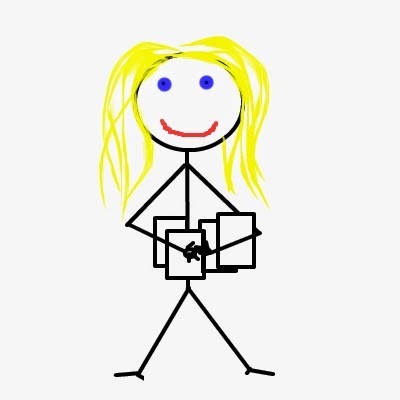
Crazy
When it comes to your books, it pays to be just a little obsessive-compulsive. It's a good idea to be just a little bit -- I said a little bit! -- crazy. Like me. And seriously, I'm a lunatic about backing stuff up. I'll tell you how you can be, too.
First, you're going to need a cloud. I'm a big advocate of this software, so don't fight me on this. Make a copy of all your book folders and put them on your cloud. Link the cloud everywhere that it can be linked. In most cases, that's your computer itself and all your devices.
Create a new folder in your cloud. Now, make a copy of all those book files and put them here. What about your computer? You'll want to make a new folder and put a copy of all your book files here, as well. Make another new folder and put it somewhere else on the cloud. Put a copy here, too.
Now, create a new email and write it to yourself. Attach your book files to that email and mail yourself. Now you have backups in the cloud, on your computer, and even in the electronic mail.
So for now, we'll refrain from taking things to the next step: tattooing your book directly to your skin.
I'm kidding, of course. Please don't do that! But please do back up...compulsively and obsessively. You should bake up your files every single time they change. Make copies and back them up again. Do it again! You may end up with 7 files with the same name, but isn't that much better than losing the one file that was the only copy you had?

Crazy
When it comes to your books, it pays to be just a little obsessive-compulsive. It's a good idea to be just a little bit -- I said a little bit! -- crazy. Like me. And seriously, I'm a lunatic about backing stuff up. I'll tell you how you can be, too.
First, you're going to need a cloud. I'm a big advocate of this software, so don't fight me on this. Make a copy of all your book folders and put them on your cloud. Link the cloud everywhere that it can be linked. In most cases, that's your computer itself and all your devices.
Create a new folder in your cloud. Now, make a copy of all those book files and put them here. What about your computer? You'll want to make a new folder and put a copy of all your book files here, as well. Make another new folder and put it somewhere else on the cloud. Put a copy here, too.
Now, create a new email and write it to yourself. Attach your book files to that email and mail yourself. Now you have backups in the cloud, on your computer, and even in the electronic mail.
So for now, we'll refrain from taking things to the next step: tattooing your book directly to your skin.
I'm kidding, of course. Please don't do that! But please do back up...compulsively and obsessively. You should bake up your files every single time they change. Make copies and back them up again. Do it again! You may end up with 7 files with the same name, but isn't that much better than losing the one file that was the only copy you had?
Published on February 03, 2015 05:30
February 2, 2015
Writing 101: Are You Too Emotionally Attached?
It takes a writer to create a horror story, because writers know horror. If your computer has ever imploded and erased your files, if you've ever lost that chapter and don't know where it went, if you've ever been held hostage by a crazy woman and was forced to burn a manuscript, then you know how to answer this question: are you too emotionally attached?
$&!/ Happens
I really don't care who you are or what your process is. If you write long enough, at some point something is going to happen. There will be a random bolt of lightning, a system wide crash, a cat that jumps on the keyboard and somehow manages to reset the hard drive in 10 seconds when you couldn't figure out how to do it in three hours while reading the user's manual. You will, no matter what, lose some of your writing. You may lose a few pages, an entire chapter, or even a whole manuscript. It's going to happen no matter how careful you are. And when it does, you'll find out pretty quickly whether or not you're too emotionally attached. Since you're a writer, you probably are. But you can't be, because the world is full of cats and lightning.
After all, you never know when you'll be taken hostage by some psycho and be forced to destroy the only copy of your manuscript. You know it can happen. That's why you can never get too emotionally attached. Into every writer's life, a bad review will fall. A snarky comment will be made. Disappointment will follow. And if you're too emotional about it, it's just going to be that much harder to write the next book.
Remember that: there is always another book. Your job is to create. To pour yourself into every tale, to give it all you've got. Then, you've got to let it go completely. You've got to move into the next, and devote yourself to it. Get emotional about every book...but then, stop.
$&!/ Happens
I really don't care who you are or what your process is. If you write long enough, at some point something is going to happen. There will be a random bolt of lightning, a system wide crash, a cat that jumps on the keyboard and somehow manages to reset the hard drive in 10 seconds when you couldn't figure out how to do it in three hours while reading the user's manual. You will, no matter what, lose some of your writing. You may lose a few pages, an entire chapter, or even a whole manuscript. It's going to happen no matter how careful you are. And when it does, you'll find out pretty quickly whether or not you're too emotionally attached. Since you're a writer, you probably are. But you can't be, because the world is full of cats and lightning.
After all, you never know when you'll be taken hostage by some psycho and be forced to destroy the only copy of your manuscript. You know it can happen. That's why you can never get too emotionally attached. Into every writer's life, a bad review will fall. A snarky comment will be made. Disappointment will follow. And if you're too emotional about it, it's just going to be that much harder to write the next book.
Remember that: there is always another book. Your job is to create. To pour yourself into every tale, to give it all you've got. Then, you've got to let it go completely. You've got to move into the next, and devote yourself to it. Get emotional about every book...but then, stop.
Published on February 02, 2015 05:30
January 29, 2015
Writing 101 Redux: Should You Ever Give Up?
Should you ever give up on being a writer? At some point, are you just wasting your own time and everyone else's? To answer the question, I'm going to re-visit one of my favorite former Writing 101 posts.

Today's Throwback Thursday tip will help you answer the question of whether or not you should ever give up on your writing, and I'm not pulling any punches.

Today's Throwback Thursday tip will help you answer the question of whether or not you should ever give up on your writing, and I'm not pulling any punches.
Published on January 29, 2015 05:30
January 28, 2015
Writing 101: How to Make a Word
The English language has more words in it than I personally think is necessary. The vocabulary is so big, experts can only guess at how many words there actually are. That's because language is a changing thing, something that's always evolving. You can actually force some of those changes yourself. You just need to know how to make a word.

The Right Words
I'm not a big fan of inventing words, because like I said the language is already too big, but if you're going to do it you may want to try using a formula. There's a really easy way to invent new words, and people have been using it for years. Just add -ish.
How else would the word sheepish exist, if this trick didn't work? I was taking a picture of someone, once, and I told them to look look sheepish. It's one of those words you find in books all the time, sheepish, and even as I gave the direction I realized I don't really know what the word means. Timid, maybe? Bashful? I don't know; I've never really been around a living sheep.
I have, however, been around a book. So I might use the word bookish to describe someone, another simple word. If you need to convey a simple concept and you can't find an adjective that will do, just add -ish, and invent your own word.

The Right Words
I'm not a big fan of inventing words, because like I said the language is already too big, but if you're going to do it you may want to try using a formula. There's a really easy way to invent new words, and people have been using it for years. Just add -ish.
How else would the word sheepish exist, if this trick didn't work? I was taking a picture of someone, once, and I told them to look look sheepish. It's one of those words you find in books all the time, sheepish, and even as I gave the direction I realized I don't really know what the word means. Timid, maybe? Bashful? I don't know; I've never really been around a living sheep.
I have, however, been around a book. So I might use the word bookish to describe someone, another simple word. If you need to convey a simple concept and you can't find an adjective that will do, just add -ish, and invent your own word.
Published on January 28, 2015 05:30
January 27, 2015
Writing 101: Even If I Over-Use Even...
Every writer has flashes of insight every so often, and thankfully I am no exception. And just the other day, while I was proofreading something, I had to scold myself aloud. I had to tell myself something: you use the word "even" too much. And I do. Are you doing it, too?
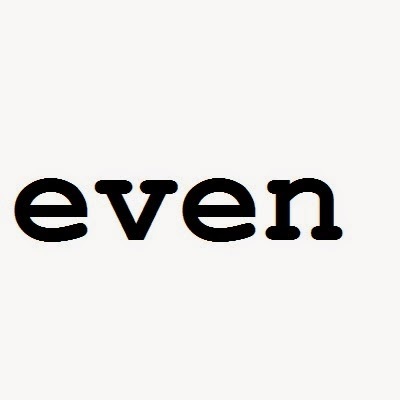
Even If I Do...
It's not the first problem I've had with "empty" words that don't really lend anything to the story that I'm writing. I even wrote an entire post about my weird habit of preceding most of my sentences with "it seems" for a long period of time. Mark Twain had a problem with the word "very." Right now, I'm even over-using "even" -- so often that I keep finding little ways to slip it into my writing, even now.
Mainly, the word even means something that is flat and level, smooth. It also means equal. But sometimes, by people like me, the word is used to emphasize. And I have problems with a lot of the words that are used to emphasize. Lots of writers do.
Adding a word like even is a simple way to make something stand out in a sentence, to highlight the importance of what you're saying. The trouble is, it's too easy. Look at these examples:
He pulled out my chair, he opened the door for me, he even held my hand when we crossed the street.
Now you know that the part at the end is important, because there's emphasis there. When used this way, the word does have power. You've just got to make sure you aren't exercising that power too much. You can see where I'm using the word too much above the jump. Skip over all those bold evens, and the whole thing will read much better.
Are you over-using the word even too much? Do what I did: highlight your evens in some way and read them. Make them all stand out, and you'll see if you're trying to make your writing stand out too much.

Even If I Do...
It's not the first problem I've had with "empty" words that don't really lend anything to the story that I'm writing. I even wrote an entire post about my weird habit of preceding most of my sentences with "it seems" for a long period of time. Mark Twain had a problem with the word "very." Right now, I'm even over-using "even" -- so often that I keep finding little ways to slip it into my writing, even now.
Mainly, the word even means something that is flat and level, smooth. It also means equal. But sometimes, by people like me, the word is used to emphasize. And I have problems with a lot of the words that are used to emphasize. Lots of writers do.
Adding a word like even is a simple way to make something stand out in a sentence, to highlight the importance of what you're saying. The trouble is, it's too easy. Look at these examples:
He pulled out my chair, he opened the door for me, he even held my hand when we crossed the street.
Now you know that the part at the end is important, because there's emphasis there. When used this way, the word does have power. You've just got to make sure you aren't exercising that power too much. You can see where I'm using the word too much above the jump. Skip over all those bold evens, and the whole thing will read much better.
Are you over-using the word even too much? Do what I did: highlight your evens in some way and read them. Make them all stand out, and you'll see if you're trying to make your writing stand out too much.
Published on January 27, 2015 05:30



